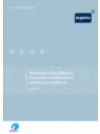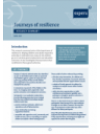At the request of the Minister for Social Development, Superu commissioned research on the importance of resilience in helping children and adults respond to adversity. Our research specifically looks at how many at-risk children go on to achieve good employment and education outcomes, and investigates the key factors that contribute to these good outcomes.
This research was commissioned from the Ministerial Social Sector Research Fund, which is used to respond to research and evaluation questions from Ministers about social sector issues.
Key Results
Analysis of national administrative data identified 121,400 at-risk children (who made up 14 percent of all children aged 0-14 years in 2013). Just over 53,800 (44 percent) of these at-risk children were projected to have positive education and employment outcomes.
In comparison, 79 percent of the children in the low or no-risk group were projected to have positive education and employment outcomes.
Participants in our qualitative study told us that the following protective factors helped them be more resilient and achieve despite childhood adversity:
- positive individual attitudes, beliefs and aspirations and self determination
- close relationships and strong supportive networks
- accessible and supportive social, community and health services, such as counselling, to support children and adults in their healing process.
These could be further enhanced by providing:
- effective early intervention, for children and their families and whānau, to prevent adversity and to provide effective support when it occurs
- a whole-of-family approach to address the multiple and complex issues within families and whānau
- adult education opportunities, to build confidence and vocational capability and a pathway to strengthen positive outcomes in education and employment.
There is a cultural dimension to resilience. Māori participants shared many of the same resilience strategies as non-Māori, however, the way this was conceptualised and described was often different for Māori participants.
One of the other key themes to come out of the study was the importance of children being believed if they reported abuse, and being encouraged and supported to achieve their life goals.


